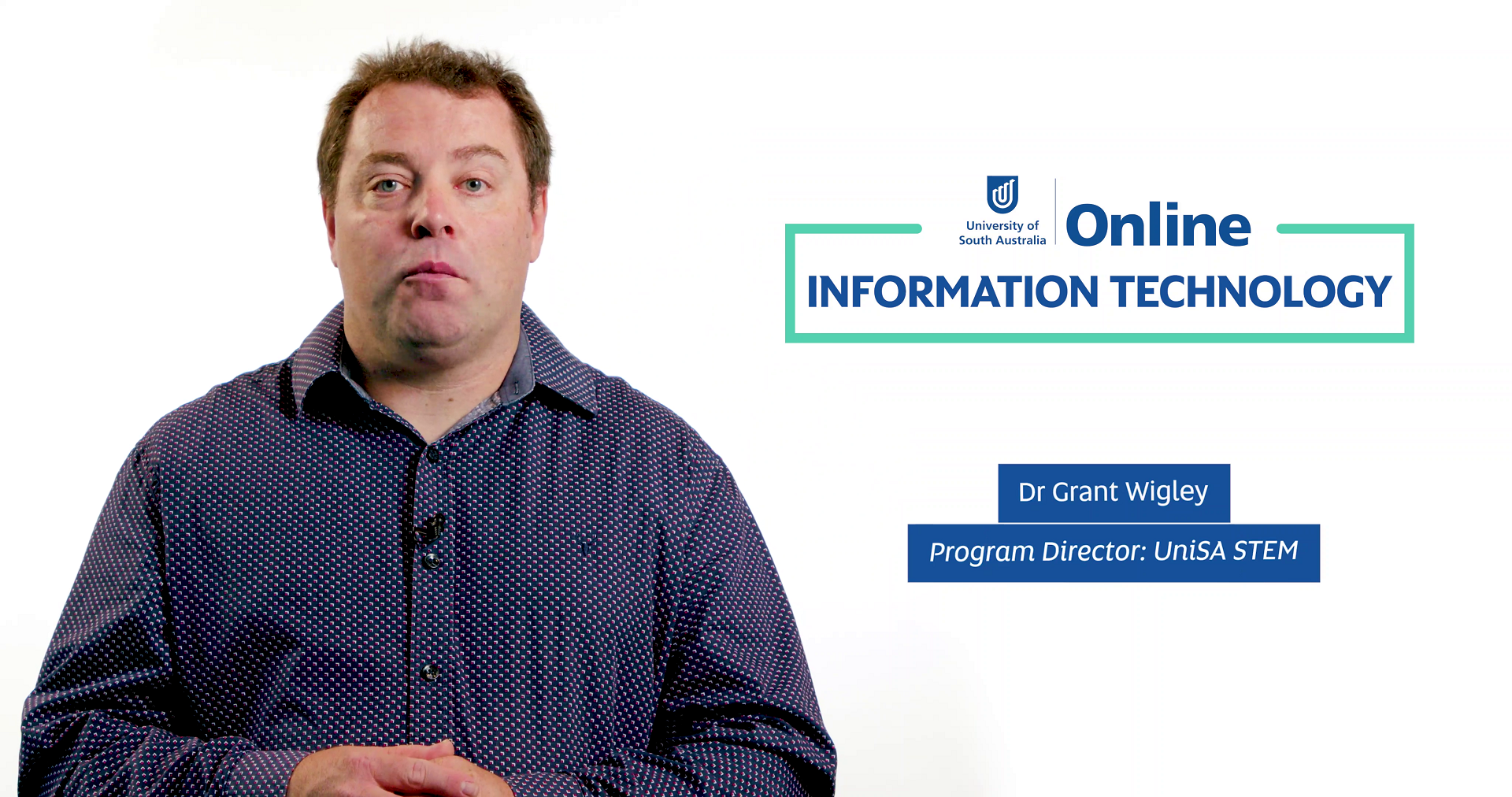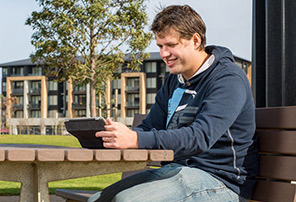You're viewing degree information for International students
You're an International student if you are:
- NOT an Australian or New Zealand citizen
- NOT an Australian Permanent Resident (including Permanent Humanitarian Visa holders)
Please remember your residency (the country you are currently in) has no impact on whether you are an Australian or International student.
UniSA Online degrees normally require international students to study outside of Australia. If you would like to study a UniSA Online degree within Australia, your visa conditions will need to allow online study. For advice on eligibility to study onshore in Australia, please contact us.
Bachelor of Information Technology
Degree Level Undergraduate
Year 2025
-
View full entry requirements Hide full entry requirements
Entry requirements
Admission criteria
The admission criteria have been grouped to assist you to easily find the information most relevant to your circumstances. However, you may fit into more than one and the university will consider applicants against each of the relevant criteria.
Certain conditions apply. For more information refer to Appendix 4 of the University's Selection and Entry policy.
The admission criteria have been grouped to assist you to easily find the information most relevant to your circumstances. However, you may fit into more than one and the university will consider applicants against each
of the relevant criteria.Certain conditions apply. For more information refer to Appendix 4 of the University's Selection and Entry policy.
Applicants are required to meet one of the following criteria with a competitive result:Higher education study
- Successfully completed equivalent to a minimum of half a year of full-time study over a higher education
program at a recognised higher education provider
OR
Vocational Education and Training (VET)
- Complete an award from a registered training organisation at Certificate IV or above
OR
Work and life experience (for domestic students only)
- Passed a UniSA Online literacy and numeracy test and have relevant work experience, or
- Completed a 12-month UniSA Foundation Studies program or equivalent, or
- Qualify for Special Entry
OR
Recent secondary education
- Completed a secondary education qualification equivalent to SACE, such as an interstate year 12 or
international qualification
Essential requirements for admission
Prerequisites
NoneAssumed Knowledge
NoneEnglish language entry requirements
In addition to meeting academic entry requirements, international students who speak English as a second or additional language must also meet the University¿s English language entry requirements. The minimum language requirements for this program are:English language testPlease access the following link for a comprehensive list of English language tests accepted by UniSA and other important information in relation to meeting the University’s language requirements: English Language Equivalence Table (PDF)- IELTS total [6]
- IELTS reading [6]
- IELTS writing [6]
- IELTS speaking [6]
- IELTS listening [6]
Admission Requirements by Country
Bangladesh HSC 3.5 Canada High School (OSSD) 60 Eynesbury FSP 310 German Abitur 3.8 Kenya KCSE (average) B Malaysia STPM (best 3) 6 Malaysia UEC 32 Norway GPA 2.8 Pakistan HSSC 75 Sri Lanka A Levels (best 3) 6 Sweden GPA 12.5 UK Board GCE A Levels/HK Board 6 Vietnam 7 Australia 65 IB (best 6) 26 USA SAT (1600) 1050 India (best 4) State Board 70 India (best 4) Central Board 60 HKDSE 15 Nepal NEB 2.41 - Successfully completed equivalent to a minimum of half a year of full-time study over a higher education
Degree overview
- Gain the skills to design, implement and test small and large software systems.
- Learn fundamental programming constructs that can be applied to programming languages, such as Python.
- Learn how information systems and business intelligence can enhance business operations and drive decision making.
- Evaluate the impact of contemporary cybersecurity threats within an organisational context.
- Discover common Agile principles and methodologies including the Scrum process.
- Enhance your problem-solving skills and tackle challenges from a range of perspectives using design thinking principles.
- Study with a university ranked Top 10 in Australia for graduate skills in I.T.1
1Ranked #8, ComparED (QILT) Student Experience Survey 2021-22, Computing and Information Systems – Skills Development Indicator (Undergraduate). Public universities.
Snapshot

Study On Demand – a 100% online IT degree designed specifically for online learning. Take full control over your study – access support seven days a week, plan your study to fit around your life, view learning resources 24/7, and log into the interactive online environment anywhere, any time and on any device.
Technology is reshaping the workforce, redefining jobs, and creating new roles never seen before. Your IT degree provides you with a broad skillset to help you build a rewarding career in this fast-moving and dynamic sector.
Study a range of IT courses that will give you a solid foundation in networking, database development, programming fundamentals, and systems analysis and design. Gain the skills to design, implement and test small and large software systems. Learn to configure and administer complex computer and database systems. Examine how organisations design, manage and use information systems and technology as an important corporate resource.
As an IT graduate, you’ll leave with the skills to design and deliver effective solutions to solve organisational problems. You can also broaden your job opportunities by selecting one minor from a different discipline, such as business, data analytics, digital design, or management.
What you'll learn

In a world dominated by computers and software, being able to read and write code is a relevant and important skill. Your UniSA Online courses cover fundamental programming constructs that you can apply to a host of programming languages, such as Python.
Systems analysis and design play an integral role in the development of information systems and are critical to helping organisations solve business problems. In system analysis, you’ll explore several information gathering techniques to identify functional and non-functional requirements from various stakeholders. As you move through your courses, you’ll learn to create a visual representation of all the requirements to communicate with team members, users, and designers. Become well-versed in Unified Modelling Language (UML), the standard graphical modelling terminology used for information systems, and explore methodology, models, tools, and techniques commonly used in systems development.
Organisations recruit professionals who can conceptualise and employ innovative approaches to tackle highly complex problems. Learn how to solve problems using the five-stage Design Thinking model proposed by Stanford University’s Hasso-Plattner Institute of Design (d.school). The concept of design thinking has made an impact on how organisations operate and how they plan for the future. From small-to-medium businesses to large corporations, organisations across a diverse set of industries like banking, retail, telecommunications and even film and production, are increasingly embedding the design thinking methodology into the workplace itself. Your UniSA Online IT courses will give you the skills to contribute on a much more strategic level within your organisation.
Agile development is the leading trend in system development. Throughout your studies, you’ll explore a range of techniques and methods, such as the Scrum methodology, that allows project teams to respond rapidly to changing requirements. You’ll cover data-driven web technologies and will learn to construct dynamic websites that utilise queries to retrieve data from databases. One of your courses will also examine a range of contemporary cybersecurity threats from a technical perspective.
All UniSA Online degrees take a practical, hands-on approach to learning. Your courses have been structured in a way that allows you to learn theoretical components before putting what you’ve learned into practice in a simulated workplace environment. As part of your major project, you’ll develop an app that helps consumers achieve their goals – whether that be through developing solutions for real-time in-store pricing or mobile-centric biometric authentication. In your final year, you’ll work in groups with industry partners to solve real-world IT problems hosted by a range of companies across a variety of sectors. You’ll interact with their employees and will produce deliverables to a professional standard, which you can add to your resume.
Why Bachelor of Information Technology

Study at a university that delivers cutting-edge, world-class research in Information Technology1 and Computing and Information Systems2.
UniSA is home to world-leading research centres including the Future Industries Institute, Innovation and Collaboration Centre and Australian Research Centre for Interactive and Virtual Environments. Our researchers deliver technical expertise and advice to industry, government, and community groups to deliver innovative and sustainable solutions that respond to the world’s challenges.
Your UniSA Online IT degree integrates research discoveries into your course curriculum. You’ll also learn using the latest technology and software allowing you to hit the ground running when you graduate.
With trends and technology constantly changing, organisations need professionals who can apply, configure, and manage IT technologies to solve business problems. This qualification has been designed to ensure you’re learning the latest advancements in the field so that you graduate with a skillset employers expect from IT professionals.
1Results in Information and Computing Sciences -2018 Excellence in Research for Australia (ERA).
2Results in Distributed Computing and Information Systems -2018 Excellence in Research for Australia (ERA).
Your career
The digital challenges faced during COVID-19 have, in many cases, accelerated the shift to online, and highlighted the importance, more than ever, of investing in IT and digital infrastructure to remain competitive. This has resulted in an increased demand for people with IT skills. In fact, by 2027, the number of technology workers in Australia is forecasted to reach one million1, and this growth is showing no signs of slowing.
Every organisation today needs a team of IT and computer experts to keep its systems running. You can find work in almost every industry including financial services, entertainment, government, hospitality, healthcare, agriculture, manufacturing, and retail. This is a broad and generalist IT degree allowing you to take your career in several different directions.
A UniSA Online IT degree can help you pursue the following careers:
-
Software developer: Design, develop, test and deploy features or entire applications; participate in the entire software development lifecycle including requirements analysis, design, development, quality assurance and deployment; maintain and update existing websites, servers and systems; develop systems and tools that support and integrate various business systems, flows and data output; interact with clients to clarify business requirements for new and existing projects; design the relationships and objects for a full desktop or web-based application; develop relationships with key stakeholders at all business levels.
-
Cybersecurity analyst: Record and resolve cybersecurity problems to support the organisation’s cybersecurity posture; provide timely and effective support for all cybersecurity incidents and events; track assets for security-related software, hardware and certificates; demonstrate expert knowledge in undertaking ICT security compliance and cybersecurity risk assessments and produce security documentation for both current-state and target-state; deliver information security solutions that meet business requirements and compliance obligations; review regular intelligence briefs to understand any changes to the threat landscape; identify deficiencies in monitoring systems and recommend improvements.
-
Full-stack developer: Work cross-functionally between both the front end and back end; be responsible for the entire flow of the user experience, from its load time and layout to its interactivity and structural underpinnings; demonstrate knowledge in every level of how the web works; set up and configure Linux servers, write server-side APIs, dive into client-side JavaScript powering an application, and turn a ‘design eye’ to the CSS.
-
IT consultant: Plan, design and install information technology systems for clients; work with industrial and commercial clients on their business and IT problems; consult staff from different parts of a client’s organisation; determine information system requirements and define project objectives; make recommendations on appropriate hardware, software and systems; design, install and trial new systems and software and fix any issues that arise.
-
Systems analyst: Analyse how well software, hardware and the wider IT system fit organisational needs; engage with business stakeholders to develop data requirements; undertake complex analysis of source system databases and data stored in AWS and other cloud computing services; design and develop data views to support report development; facilitate testing for new ingestion pathways or enhancements to existing pipelines; determine the solution for tools, data storage and data integration to support interactive reports and analysts; work in an agile delivery team.
-
Computer programmer: Write and test code for new mobile applications or computer programs; create and install updates for existing software programs to improve the user experience; identify and correct coding errors; rewrite code in different languages so that programs and applications are compatible with different operating systems; demonstrate experience with Java, C#, SQL server database, C++, HTML and CSS; possess advanced knowledge of Windows operation systems and Microsoft software.
-
User interface developer: Use programming code such as JavaScript, CSS and HTML to create interactive programs that enhance a customer’s experience on a business’s website or platform; develop features to enhance the user experience; optimise web pages for maximum speed and scalability; collaborate with back-end web developers and programmers to improve usability.
-
Network analyst: Investigate, diagnose and resolve network problems including firewalls and security devices; develop network architectures that support IT needs; test network performance and provide statistics and reports; develop strategies to maintain network infrastructure; develop and maintain procedures and documentation for network support; administer the operation and control of all ICT systems and services; investigate causes of incidents, requires and problems; manage and maintain the service compliance of all ICT and service assets in line with organisational and regulatory requirements.
1Australia’s Digital Pulse Report 2020.
Thinking of studying soon?
Industry facts
Your study experience and support
Study On Demand
Our online career-focused degrees give you full control and ultimate flexibility over your study. It’s Study On Demand, on your schedule, on your terms.
- Designed specifically for your online learning
Designed by a team of academic and online experts, our course materials are delivered in an interactive way using innovative digital technology and state-of-the-art teaching and learning resources. - Study when it suits you
Our online degrees support students who lead busy lifestyles. With four start dates a year in January, March, July and September there is no need to interrupt your life. - Take control of your study schedule
With all content available from day one of your course, you have the power to plan your study schedule in advance. - Finish each course in 10 weeks
Our courses are delivered within 10-week terms to keep you motivated throughout your degree. Study two courses a term or just one. - 100% online study
You won’t need to come onto campus for coursework, assessments or exams. Complete all study for your degree where it suits you. - Get the help you need
Whether you need help with course content or assessments, we offer the academic support and services you need to be successful in your studies. - Adjust your study to your life
There’s no need to interrupt work and family life or spend money on travel and student accommodation. Organise study around your life. - Learn from world-renowned academics
Get a degree that’s designed and taught by leading academics and industry professionals. - 100% online interactive learning environment
Our interactive online learning environment supports all your study needs. Log in anytime, on any device, wherever it suits you. - Access a library of over 700,000 digital resources
Access a library of more than 700,000 digital resources including e-books, videos and journal articles. Our Ask the Library virtual service can help you locate, access, evaluate, use and reference a range of information resources.
What others are saying
IT Requirements
Generally, any desktop or laptop computer purchased in the past three years should be capable of meeting your online learning needs. While mobile devices such as tablets and smartphones will be able to access most of your online course content, there are likely to be elements of most courses where we recommend you use a desktop or laptop computer. Your computer should be able to:
- run a modern browser (Microsoft Edge, Firefox 24, Safari 5, or Chrome 32 or later versions)
- run Java
- run programs to create documents, spreadsheets and presentations
- use a web camera and headset (or ear pods with microphone)
- Some UniSA Online degrees require an online exam. The online exam software – Remote Proctor Now – has specific capability requirements. Please refer to the system requirements prior to conducting your exam to ensure your computer is compatible.
Access free IT software and resources
As a UniSA Online student, you'll:
- Get free access to the full Office 365 ProPlus suite, which includes full versions of Word, PowerPoint, Excel, Outlook, OneNote, Publisher, Access and Lync software. Install the full suite on up to five different devices (PC and Mac compatible).
- Get 1Tb of personal storage that syncs with your PC or mobile device through OneDrive - it's like an extra hard drive that allows you to open any of your files from any of your devices, whenever you need them.
- Get free access to LinkedIn Learning - Access more than 5000 video courses on a broad range of topics such as: the Microsoft Office suite, time management and study skills, health and wellbeing, communication and presentation skills, photography, film making and designing your own games or mobile apps.
- Be able to connect with others using Microsoft Teams, Yammer and the Outlook Web App.
There are some degrees that have specialised software requirements. We've made this software available to students to access for free - you'll be able to download and install any of the required programs on your own device anywhere and anytime. See if your degree requires specialised software.
Check your device
Our computer system test will determine if your device has the base system resources and software required to study online. It'll also check the speed of your internet connection.
See if your computer, laptop or device is all set up and ready to go – it takes just a few seconds.
The application process is easy – just follow these simple steps:
-
Submit an online enquiry
If you're ready to apply, the first step is to fill out and submit our online enquiry form. Here you'll be asked a series of questions to see if you're eligible. Following your online enquiry, one of our Degree Advisers will contact you at your preferred time to discuss the application process.
Enquire now > -
Speak to a Degree Adviser and start your application
If you're eligible, you'll receive an email outlining the entry requirements and the relevant documentation you need in order to be considered.
In order to verify your academic qualifications, you'll need to upload relevant documents like your official parchment, certificates or transcripts. If you have work experience, you will need to upload your CV as well as any other documents like work references, professional recognition or accreditation or your training certification.
Your email will contain information on the specific documents you need to provide as well as a link to begin your application. You'll be asked to create an account and set your own password.
-
Complete your application and send through your documents
In order to proceed with your conditional offer, you’ll need to complete your application and provide required evidence of your previous study or work experience.
Enquire now >
Alternative Pathways
Australian
There are other pathways you can follow to study this degree, including:
- UniSA College Diploma in STEM (Information Technology)
- UniSA College Undergraduate Certificate in University Studies (STEM)
- UniSA Online UniStart
-
When should I apply?
UniSA Online degrees start four times a year in January, April, June and September. There are key application dates for each term. If you're looking to apply for credit, there are different closing dates you need to be aware of, so it's always best to double check. Key dates can be found at unisaonline.edu.au/key-dates.
-
Do I have to be online at set times?
All of our courses are asynchronous, meaning you choose when to study, whenever it suits you. However, if your degree has online exams, you will need to sit these at a designated date and time. Some courses may also require you to speak to your academics via phone or online communication channels at a mutually agreed time as part of your assessment.
-
What academic support is available?
Our academics are available seven days a week, including weeknights. Throughout your degree, you’ll be supported by our highly experienced academic team of Online Course Facilitators and casual academics. Our teaching team will guide you through your learning and ensure you have an outstanding, high-quality education.
They can help you with your course materials and assessments, provide feedback on your work, assist you with referencing, and can answer any other course-specific queries.
You’ll be able to contact your academics via email, online discussion forums and live messages in the online learning environment. You can also communicate in real-time and chat face-to-face with your academics online.
If you need after-hours learning support, Studiosity is a great resource that can help you with your writing, academic language, grammar and referencing. You’ll also be able to chat online with a Studiosity online adviser.
-
How is my degree structured?
Full-time students study two courses each term. It makes earning a degree completely achievable, especially if you’re working. Your degree is delivered over four terms each year. Each term runs for ten weeks with two-week breaks in between each term.
You’ll also have the option to go part-time, or switch between the two. If you need to take a break in your study, that’s an option too. We recommend speaking to your Student Adviser who can help you update your study plan and check when your courses are offered.
-
What career prospects do I have with my university qualification?
Our degrees are designed in conjunction with industry experts, employers and professional associations, and informed by the latest developments in your field. You will graduate with in demand skills and up-to-date knowledge required by industry.
You will be studying with a university known for its employment outcomes. Your UniSA degree is more than just a piece of paper – it will prepare you to start your career, or take it to the next level. UniSA's online students have graduate employment rates well above the national average.*
UniSA Online qualifications follow the same Government Higher Education Standards Framework as our on-campus degrees. The parchment you receive at the end of your degree will be the same as any other University of South Australia student.
*UniSA External UG full-time employment rate 83% Graduate Outcomes Survey 2018
-
What are the main differences between online, on-campus and distance education?
The knowledge you gain from each mode of study is the same – it's how you get there that's different. When you study online, everything from your course material to weekly activities and assessments are fully online. You'll communicate with academic staff and students via live messages, online discussion forums and email.
Studying on campus requires students to physically come on to campus at specific times to attend lectures, tutorials and practicals. On-campus students have face-to-face contact with academics and fellow students and also communicate via email and online discussion boards.
Distance Education involves physical course material packages being sent to students, usually print based but occasionally audio or video. Communication is usually via telephone, mail and email. In today’s digital era, distance education has been superseded by online education.
More FAQs








.jpg)